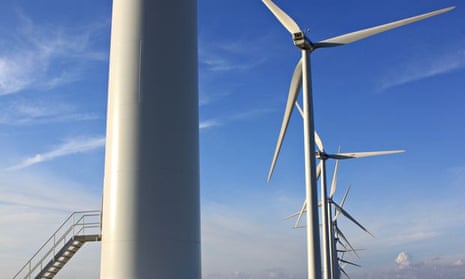Melbourne’s leading renewable energy companies have cut nearly one in 10 jobs over the past year owing to uncertainty in the sector, according to an environment group that is calling on Victorian Labor to implement a state-based renewables target if it wins power.
A survey of 15 clean energy businesses found that overall job numbers fell from 556 in 2013 to 507 in 2014, representing a 9% drop.
Friends of the Earth, which conducted the poll, said the job losses were due to uncertainty about the future of the national renewable energy target, which mandates that 41,000 gigawatt hours of Australia’s energy comes from renewable sources by 2020.
The federal Coalition has tried to radically scale back the RET, which the industry warns would decimate jobs and investment in the sector. The Senate appears unlikely to agree to a scaling back of the RET after a vigorous campaign to preserve it. The crossbench senator David Leyonhjelm has put forward an alternative plan, although the renewables sector says this would also be disastrous.
A Climate Council report found that Victoria is one of the worst performing states on renewables, with a trio of Melbourne councils announcing they will bypass state and federal government policy by buying clean energy directly.
Friends of the Earth said Labor, which is on course to gain power in Saturday’s Victorian election, needed to commit to reinstating the Victorian renewable energy target.
“With the federal government failing the renewable energy sector, it is now up to Victorian politicians to step up and fill the gap,” said Leigh Ewbank, renewable energy spokesman at Friends of the Earth.
“Melbourne is at risk of being left behind in the booming clean-tech economy. Inaction is not an option for policymakers. A Victorian renewable energy target is something all political parties can support. It will unleash investment and create new jobs.”
The Victorian RET was scrapped in 2009 and rolled into the national scheme. The Greens have argued it should be brought back back, but the two major parties have declined to make this commitment.
Instead, Labor has focused its attention on a partial wind back on restrictive rules around new wind farms, which currently are banned within 2km of a residential building without written consent. Labor said it will also look to bring in a state-based emissions reduction target.
“We currently don’t have any renewables investment in Victoria so we need to get that going again,” said Lisa Neville, Labor’s environment spokeswoman. “Our focus is driving up renewables to have them available to replace fossil fuels. We need to increase the capacity and until we do that [targets] is a theoretical debate.”
Lane Crockett, executive general manager of Pacific Hydro, said his company had shed 10 staff in Victoria, with more to follow if the uncertainty over the RET continues.
“We can’t talk about the future very easily but it’s fair to say that if there’s no a resolution reasonably soon we will have to consider further cuts in staff,” he said.
Pacific Hydro has two windfarms in development in Victoria. “All of our projects are on hold and we aren’t progressing them at the moment,” Crockett said. “A state emission reduction target is important because it helps with future investment decisions. A Victorian renewable energy target is more difficult because a policy still exists nationally.
“But if the RET is slashed or removed then certainly they should bring back the VRET to encourage new investment. It was a sensible policy and when it was rolled into the national policy things went downhill from there.”

Comments (…)
Sign in or create your Guardian account to join the discussion